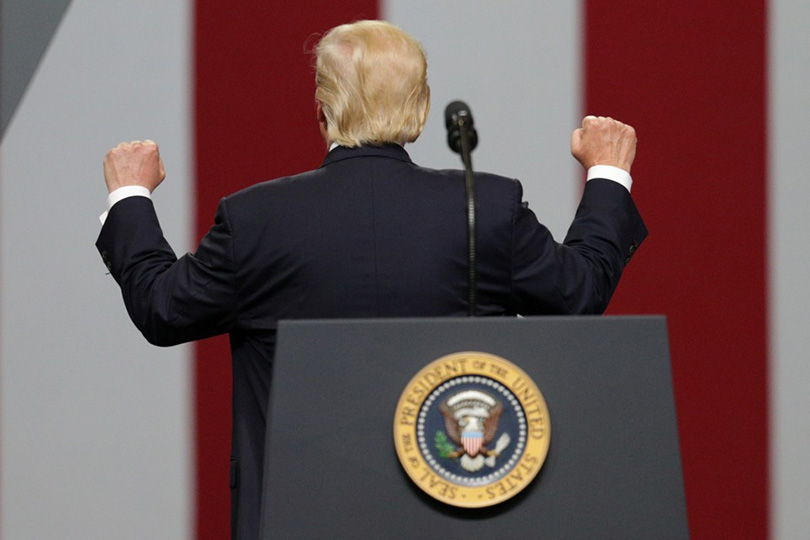In a flurry of comments historically unsuited to any head of state, yet hardly shocking for the current American president, Donald Trump this weekend targeted the two most popular sports in the country and elicited sharp criticism from some of their most important figures.
On Friday, Trump encouraged franchise owners in the National Football League to fire players who protest during the national anthem. “Wouldn’t you love to see one of these NFL owners, when somebody disrespects our flag, to say, ‘Get that son of a bitch off the field right now, out. He’s fired,’” the president said at an Alabama rally.
Trump’s comment provoked Roger Goodell, the typically reticent commissioner of the NFL, to issue a strong statement condemning the president’s divisive language. The comment was particularly surprising, since most NFL owners who elect the league commissioner are staunch Republicans. Many of the most prominent owners donated to the Trump campaign.
Trump was undeterred. On Saturday, he disinvited the NBA champion Golden State Warriors from the White House, in a tweet. This came after several players, including star guard Stephen Curry, suggested that they would skip the ceremonial visit.
In response to Trump, LeBron James, the basketball superstar whose Cleveland Cavaliers are rivals of the Warriors, called the president a “bum” on Twitter. The basketball star also pointed out the fecklessness of revoking an invitation after the other party has already declined. (Trump’s you-can’t-fire-me-because-I-quit instinct here recalls his earlier announcement to dissolve several business advisory councils, only after one of them had already disbanded.)
What is the meaning of these seemingly frivolous skirmishes with athletes and sports leagues? His true motivations aren’t clear, but his behavior does fit a pattern.
As Adam Serwer wrote here, there is a clear racial element to Trump’s pronouncements. When the NFL star Tom Brady, a white player, skipped his championship team’s White House visit, the president was silent. (Brady has described Trump as a “good friend,” and at one point displayed a “Make America Great Again” hat in his locker.) When Warriors star Stephen Curry, a black man, announced his intention to do the same, the president called him out on Twitter and rescinded the team’s invitation. In calling for NFL owners to fire protesting players, the president encourages an overwhelmingly white ownership group to disemploy members of overwhelmingly black NFL players union. As Serwer wrote, Trump’s instant criticism of Curry and black NFL players stands in stark contrast to his infamous hesitation to condemn white supremacists and neo-Nazis.
Another reason that the president cannot resist commenting on every non-political issue in American life is that he seemingly cannot stand the actual work of American governance—a preference made salient at a moment when lawmakers are busy trying to repeal the signature legislative achievement of Trump’s predecessor. Several Republican lawmakers said the president never mastered the details of health care policy. The president’s recent NFL commentary suggests that national anthem protests, on the other hand, are a debate he can engage with.
As a candidate, Trump promised to take a firm leadership role in changing American health care, tax policy, infrastructure spending, drug abuse, and regional inequality. But as president, Trump has given no national address endorsing a specific health care plan. He has given no national address endorsing a specific tax reform plan. His administration has no clear plan to begin rebuilding American infrastructure, no real urgency to address the opioid crisis, and no outline to confront the economic issues that supposedly buffeted his candidacy, like regional inequality. Instead, the president has been more inclined to reserve the precious power of his bully pulpit to target his nemeses, by name, as in the case of Colin Kaepernick and Stephen Curry.
It has been said that the age of Trump is the politicization of everything. The claim is impossible to dispute, especially one week after an Emmy’s ceremony that felt like an extended presidential roast. But it’s important to note that Trump is choosing to politicize sports and entertainment, not only because he is inclined toward controversy, but also because he is so demonstrably uninterested in actual policy and the political process.
Nobody is forcing the president to morph into a sports radio commentator. It is merely the role that best suits the skills that come most naturally to the former game-show host. Consider the simple, uncontroversial fact that in his ninth month in office, the U.S. president has a clearer position on Stephen Curry’s White House clearance than on any single detail of health care or tax reform. Trump is so bored by the quotidian demands of his surprisingly “complicated” job, which requires guiding policy through a complex political process, that he uses his position to instead harass Americans on the internet. Judging by the attention his sports commentary received this weekend, one can assume that Trump’s shock-jock-in-chief routine will be a long-running show.







Comments